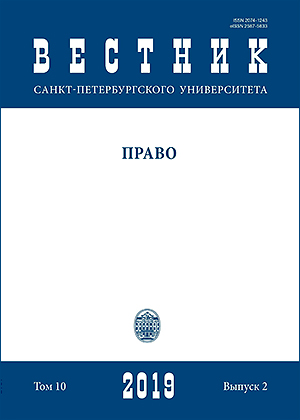New Principal Provisions of civil law in the People’s Republic of China
DOI:
https://doi.org/10.21638/spbu14.2019.213Abstract
This article examines the Basic Provisions of Civil Law in the People’s Republic of China as that country reforms the codification of civil law. One stage is the creation of new Basic Provisions of Civil Law (Law of 2017), which performs two functions. First, it fully regulates the institutions of individuals and legal entities, representation, and terms, including the limitation of action, transactions, and civil liability. Second, the Law incorporates general civil law canons that regulate certain types of civil rights (personal non-property, real, obligatory, intellectual property, hereditary, family). Old Basic provisions of civil law of the PRC (Law of 1986) have not lost their force and are applied in a manner that does not contradict the new Basic Provisions of Civil Law (Law of 2017). In addition to the Law of 1986, laws regulating certain types of civil rights (special laws) continue to be applied. The codification of civil law will end with the development and adoption of the Civil Code, which should take place in 2020. The main provisions of civil law (Law of 2017) will acquire meaning of the General Part in the structure of such code. The old Provisions of Civil Law (Law of 1986) and some special laws will make up remaining parts of the future civil code. Some Chinese scholars suggest that there are no prerequisites for the adoption of the code at this stage of economic development. Others do not see the need for codification of the civil law and support regulating civil legal relations through separate laws.
Keywords:
codification of civil law, natural persons, legal entities, representation, the limitation of action, transactions, civil rights, civil liability
Downloads
Downloads
Published
How to Cite
Issue
Section
License
Articles of "Vestnik of Saint Petersburg University. Law" are open access distributed under the terms of the License Agreement with Saint Petersburg State University, which permits to the authors unrestricted distribution and self-archiving free of charge.






